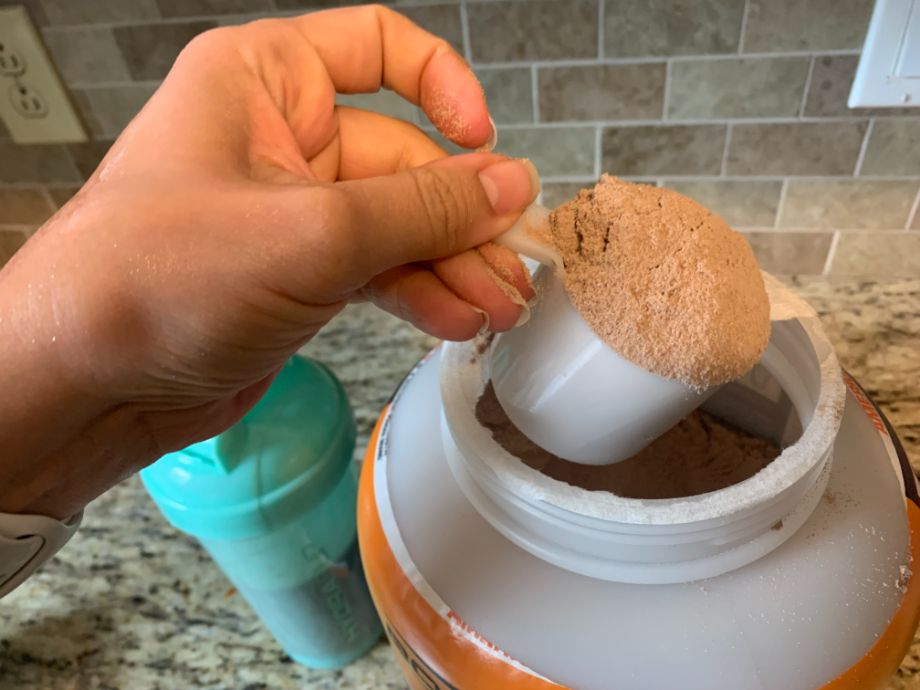We test and review fitness products based on an independent, multi-point methodology. If you use our links to purchase something, we may earn a commission. Read our disclosures.
There’s no doubt that protein is essential for good health, especially for physically active people. Eating high-protein foods can help with building muscle size and strength, supporting muscle recovery, and maintaining muscle mass while pursuing weight loss.
Many people worry, however, that a high-protein diet could damage their kidneys. And if too much protein is bad for kidney function, is protein powder bad for your kidneys, as well? These concerns have been circulating for a while and may dissuade some from getting the protein they need to reach their fitness goals.
RELATED: High-Protein Diet Side Effects
Not to fear—as a registered dietitian, I’ll discuss how the kidneys work, how protein impacts the kidneys, whether protein powder has any other potential side effects, and whether limiting protein powder is necessary for healthy kidney function. After reading this article, you’ll have a better understanding of how protein powder fits into a healthy diet.
Medical disclaimer: This article is intended for educational and informational purposes only. It is not intended as a substitute for medical advice. For health advice, contact a licensed healthcare provider.
What Is Protein Powder?
Protein powder is a dietary supplement taken to help increase a person’s protein intake. It’s a convenient, easy way for people looking to build muscle or lose weight to meet their higher protein needs. It can also help people with poor appetites get more protein throughout the day.
It can be easily mixed with water, juice, or milk, blended in smoothies, used in baking, or stirred into oatmeal or pancake batter.
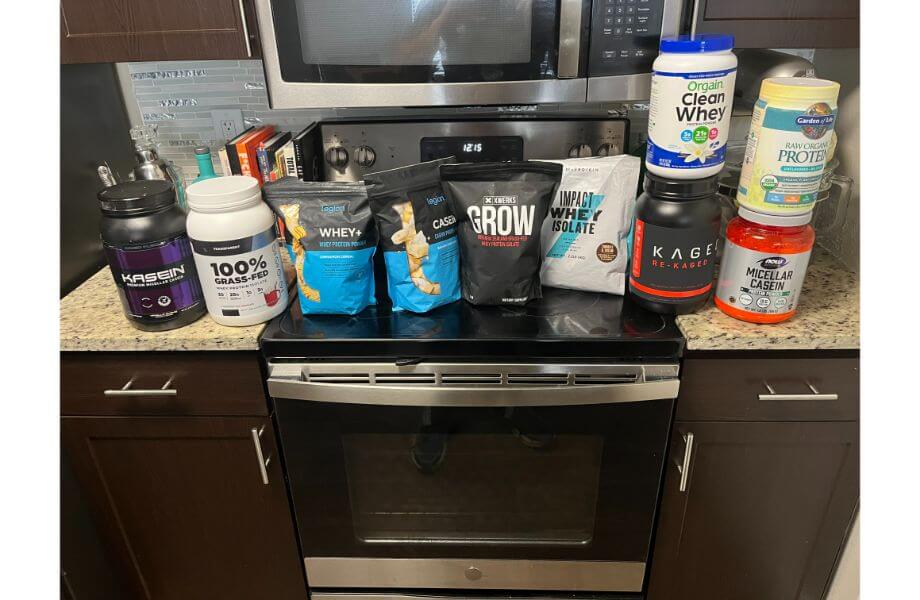
RELATED: Best Protein Powder
What Are the Different Types of Protein Powder?
With new protein powders on the market seemingly every day, it feels like almost any food can be turned into protein powder. Let’s discuss some of the most common types in more detail.
Whey Protein
Whey protein is considered the “gold standard” for protein powder thanks to its status as a complete protein, meaning it contains all nine essential amino acids in optimal proportions for building muscle and supporting overall health.
Whey is a byproduct of the cheese-making process, which begins with the enzyme rennet being added to cow’s milk. Rennet separates the solid cheese curds from liquid whey, which is sent to protein powder manufacturers and spray-dried into a powder.
RELATED: Whey Protein Side Effects
Whey protein powder is available in the following forms:
- Whey protein concentrate: Between 25-89% protein; contains significant amounts of lactose
- Whey protein isolate: At least 90% protein
- Whey protein hydrolysate: Whey protein isolate that has been processed into smaller pieces with the aim of improving absorption
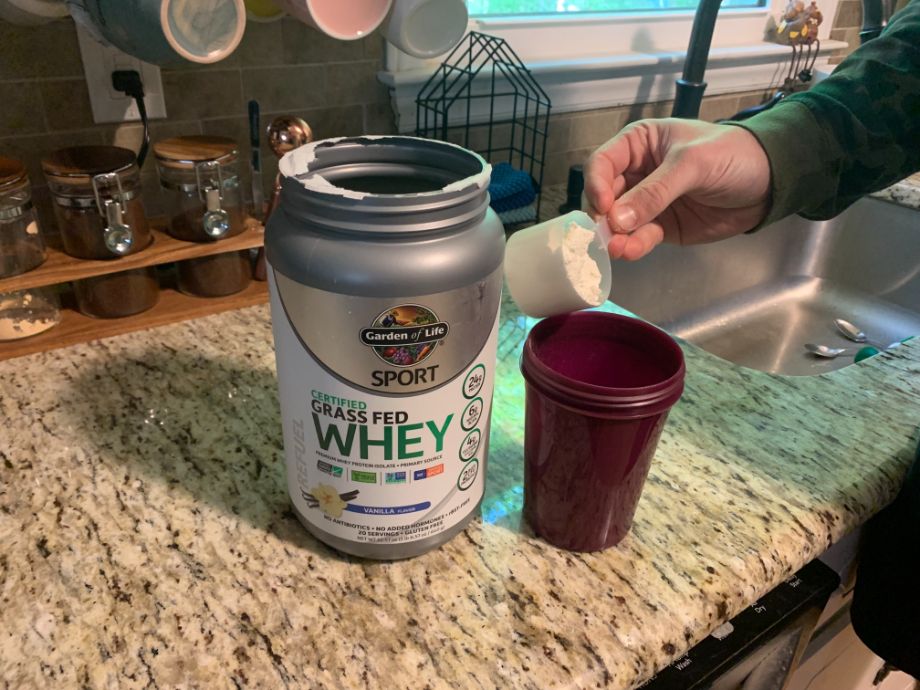
RELATED: Whey Protein Isolate vs Concentrate
Casein Protein
Casein is another complete, dairy-based protein. It’s slower-digesting than whey, making it a popular choice before bed to support the muscle-building process throughout the night.
Soy Protein
Soy protein powder is made from defatted soy flour. It’s one of the only complete plant proteins and is very close to whey protein in terms of its effectiveness for building muscle. Research1 has shown similar benefits for muscle hypertrophy and for both types of protein.
Pea Protein
A great plant-based option for people with soy allergies, pea protein is a popular supplement made from yellow split peas. Many people find it easy to digest, making it a helpful alternative for people sensitive to whey protein.
While not a complete protein on its own, pea protein nevertheless has shown promise as a muscle-building supplement. Manufacturers will sometimes add other plant proteins, such as brown rice or quinoa, to balance the amino acid profile.
RELATED: Best Pea Protein Powder
Hemp Protein
Made from hemp seeds and gaining in popularity, hemp protein is rich in anti-inflammatory omega-3 fatty acids. It hasn’t been as well-researched as soy or pea protein for muscle gains, but it’s a great alternative for plant-based eaters with legume allergies.
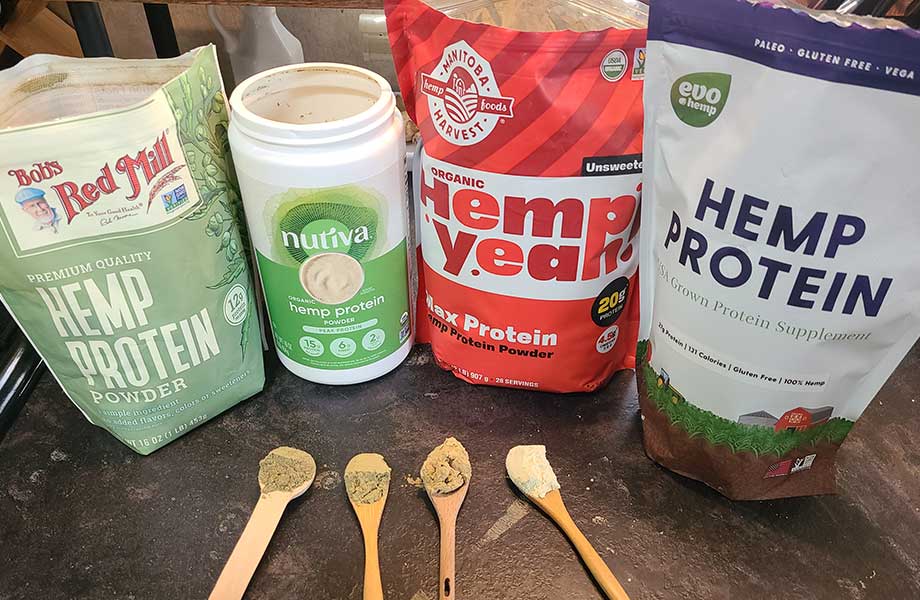
RELATED: Hemp Protein Powder Benefits
Brown Rice Protein
Brown rice protein is allergy-friendly and often used in plant-based protein blends to balance out the amino acid profile of legume-based proteins. It’s also available on its own.
How Can Protein Powder Affect Your Kidneys?
To understand whether protein powder can lead to kidney damage, let’s take a closer look at how they work.
How Your Kidneys Work
The kidneys are two small bean-shaped organs located below the rib cage. Their primary role is to clean the blood by removing toxins, wastes, and excess fluid.
Here’s a simplified rundown of how the kidneys do this:
- Blood enters the kidneys through the renal artery
- Blood passes through microscopic filters in the kidney tubules
- Toxins and waste products are removed and transported through the ureters into the bladder
- “Clean” blood is sent back into the bloodstream through the renal vein
- Waste products are removed from the body via urination
How the Kidneys Handle Protein
Some wastes removed by the kidneys are byproducts of protein metabolism. These are harmful compounds created when the body breaks down protein for various uses. An example is ammonia, a toxic chemical that the liver converts into urea. Urea is removed from the bloodstream by the kidneys.
The more protein you eat, the more protein metabolism byproducts are created, resulting in more work for the kidneys. This is where concerns about the potentially negative effects of eating too much protein come from.
However, the myth that eating too much protein will cause kidney problems in healthy people whose kidneys are not already impaired has been debunked2.
Supporting this, the authors of a November 2018 meta-analysis3 analyzed 28 studies with data from 1,358 individuals eating either a high protein diet of 1.5 grams of protein per kilogram of body weight per day or a lower protein diet. Interestingly, there were no negative impacts on kidney function with the higher protein diets.
What about even higher protein intakes? They appear to be safe for healthy people, as well. In a small study4 of male participants who ate between 2.5 to 3.3 grams of protein per kilogram of body weight for one year, the authors found no evidence of impaired kidney function. More research is needed to confirm these findings, but they’re promising.
To reiterate, this is for healthy people with normal kidney function. People with chronic kidney disease whose kidney function is already impaired may need to limit their protein intake as directed by their registered dietitian or physician.
Kidney Stones
Kidney stones are a common concern with protein powders, primarily due to the observation that high-protein diets raise urine calcium levels5. Having too much calcium in your urine can lead to the formation of calcium oxalate kidney stones.
Counterintuitively, eating more calcium can help prevent kidney stones. Calcium binds to oxalates in the intestines, helping remove them from the body before they get incorporated into urine.
Kidney stones can also form when eating too much acid-producing animal protein. This may be a risk if overconsuming whey protein, as whey is high in animal protein while being much lower in calcium than the dairy milk it’s sourced from.
If you’re prone to kidney stones, make sure you’re only taking enough whey protein to help meet your protein needs. Mixing it with milk or calcium-fortified non-dairy milk instead of water, alternating with plant-based protein powders, and eating balanced meals can help.
Other Potential Protein Powder Side Effects
Can protein powder impact the body in other ways? Possibly, depending on the individual.
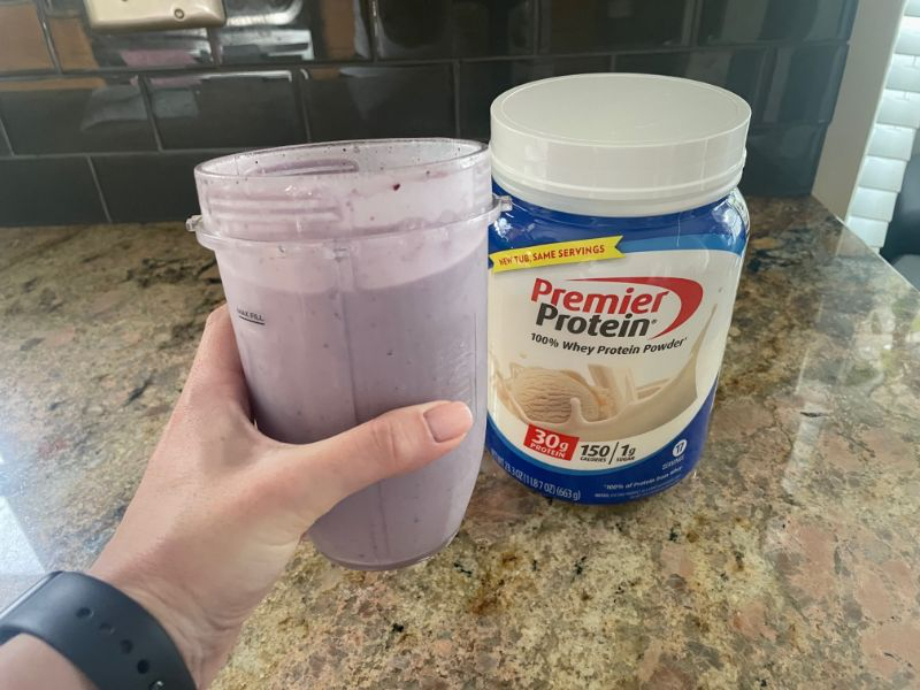
Gastrointestinal Distress
People with lactose intolerance may experience uncomfortable symptoms like bloating, flatulence, and diarrhea when consuming whey protein, especially whey protein concentrate. Compared to whey protein isolate, whey protein concentrate contains a higher percentage of lactose, a dairy-based carbohydrate.
If you have irritable bowel syndrome (IBS), you could have some GI distress when consuming soy protein since it’s high in two types of FODMAPs: galacto-oligosaccharides (GOS) and fructans.
Protein powders sweetened with sugar alcohols are also high in FODMAPs, so sensitive people may need to find products without these ingredients.
RELATED: Best Lactose-Free Protein Powder
Acne
The relationship between diet and acne is still being studied, but a January 2020 systematic review published in the International Journal of Dermatology6 suggests that whey protein could be an acne trigger for some people.
In this review, the results of three fairly small studies identified whey protein as a potential trigger. The authors theorized that this could be due to the presence of insulin-like growth factor 1 (IGF-1), a pro-inflammatory hormone found in dairy products.
More research on the potential for whey protein to cause acne is needed, but it’s worth considering for people who struggle with their skin.
Osteoporosis
High-protein diets have been accused of leaching calcium from bones, causing concern for osteoporosis. However, this risk has been overstated. Scientists now know that high protein consumption actually increases calcium absorption2 from food and is one way our bodies maintain calcium homeostasis for bone health.
How Much Protein Powder Should You Consume?
There isn’t a straightforward answer to this question since it will depend on your daily protein requirements and how much protein you’re getting from food.
For most people, however, one to two servings of protein powder a day in addition to protein-rich meals should be enough to help meet your protein needs. It’s important to eat balanced meals that include protein, complex carbohydrates, and healthy fats for good health.
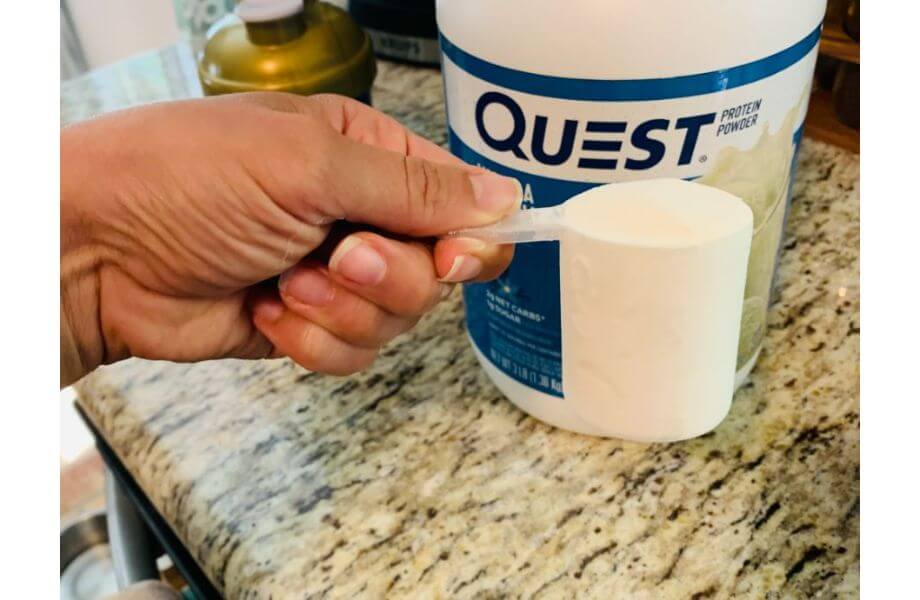
While taking more than two servings of protein powder a day likely won’t harm you, it may prevent you from getting enough vitamins, minerals, and dietary fiber if it’s displacing too many whole foods from your diet.
RELATED: A Dietitian Answers: How Much Protein to Gain Muscle?
Is Protein Powder Bad for Your Kidneys? Final Thoughts
Thankfully, the idea that protein powder and high-protein diets damage kidney function largely appears to be a myth. There is little evidence showing that high-protein diets harm the kidneys of healthy people without kidney issues.
People who do have impaired kidney health, as in chronic kidney disease, may need to moderate their protein powder intake as directed by a registered dietitian or physician. For this group of people, excess protein can indeed be risky.
And if you’re prone to kidney stones, eating lots of whey protein without getting enough calcium in the diet could be an issue.
Looking for a great protein powder? Check out our picks for the Best Protein Powder on Amazon!
Is Protein Powder Bad for Your Kidneys? FAQs
Does protein powder affect kidney function?
Normal intakes of protein powder shouldn’t negatively impact kidney function in healthy people. If your kidneys are already impaired, you may need to follow a lower-protein diet as recommended by your healthcare professionals.
How much protein powder is safe for kidneys?
Even very high protein intakes have been shown to be safe for kidneys, so there isn’t a set upper limit for protein powder. If you have kidney disease, a registered dietitian can help you determine an appropriate amount of protein powder to take.
How can I protect my kidneys on a high protein diet?
Research has shown that kidney function isn’t impaired on a high protein diet, even when consuming very high amounts. In general, kidney-protective practices that can reduce your risk of chronic kidney disease include an active lifestyle, stress management, and a healthy diet with plenty of fruits, vegetables, plant-based protein, and whole grains.
Is whey protein OK for kidneys?
Yes, there are no negative effects on the kidneys of healthy people when consuming whey protein. If you have chronic kidney disease, you’ll likely need to monitor your whey protein intake as guided by your healthcare team.
Can kidney patients drink protein shakes?
Patients with chronic kidney disease can drink protein shakes as long as they fit within their daily protein limit. People with end-stage renal disease requiring dialysis may require commercial protein shakes that are low in phosphorus or potassium and should consult the registered dietitian at their dialysis center for recommendations.
These statements have not been evaluated by the Food and Drug Administration. This product is not intended to diagnose, treat, cure, or prevent any diseases.
References
- Silva S, Carminati BC, Santos Junior V, Lollo PCB. Comparison of the Effects of Soy Protein and Whey Protein Supplementation during Exercise: a Systematic Review. J Health Sci (Londrina). 2019; 21(4):397-403. doi:10.17921/2447-8938.2019v21n4p397-403
- Cuenca-Sánchez M, Navas-Carrillo D, Orenes-Piñero E. Controversies surrounding high-protein diet intake: satiating effect and kidney and bone health. Adv Nutr. 2015;6(3):260-266. Published 2015 May 15. doi:10.3945/an.114.007716
- Devries MC, Sithamparapillai A, Brimble KS, Banfield L, Morton RW, Phillips SM. Changes in Kidney Function Do Not Differ between Healthy Adults Consuming Higher- Compared with Lower- or Normal-Protein Diets: A Systematic Review and Meta-Analysis. J Nutr. 2018;148(11):1760-1775. doi:10.1093/jn/nxy197
- Antonio J, Ellerbroek A, Silver T, et al. A High Protein Diet Has No Harmful Effects: A One-Year Crossover Study in Resistance-Trained Males. J Nutr Metab. 2016;2016:9104792. doi:10.1155/2016/9104792
- Ginty F. Dietary protein and bone health. Proc Nutr Soc. 2003;62(4):867-876. doi:10.1079/PNS2003307
- Dall’Oglio F, Nasca MR, Fiorentini F, Micali G. Diet and acne: review of the evidence from 2009 to 2020. Int J Dermatol. 2021;60(6):672-685. doi:10.1111/ijd.15390
Further reading

REP’s latest bench keeps improving on past innovations. Is this the best weight bench on the market? Find out in our REP Blackwing Adjustable Bench review. Read more

An honest Hungryroot review from our nutrition and fitness experts—what they really think about this healthy meal delivery service! Read more

Not sure of the best carbs for bodybuilding to add to your grocery list? A registered dietitian nutritionist points you in the right direction. Read more

We gathered interesting facts about the practice of yoga, popularity, and health benefits. Learn more about the benefits of yoga and why people practice this form of exercise. Read more

